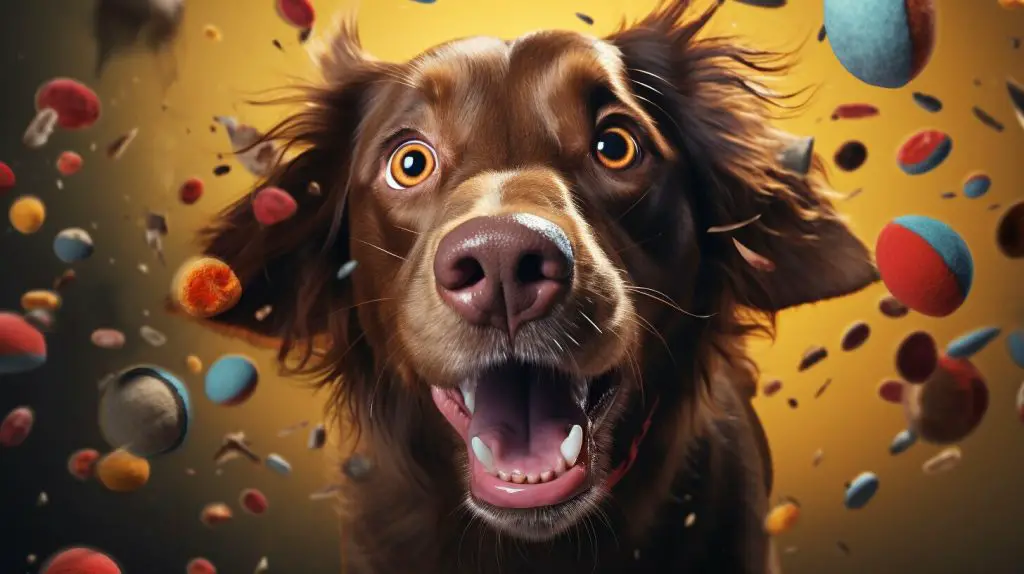As a dog owner, you may have noticed that your furry friend has a tendency to lick everything in sight. From their paws to the furniture, excessive dog licking can be a cause for concern. In this guide, we will explore the various reasons behind why dogs engage in this behaviour and provide useful tips on how to manage it.
Firstly, it's important to understand that licking is a natural behaviour for dogs. It's their way of communicating, showing affection, and exploring their environment. However, when this behaviour becomes excessive, it can signal an underlying problem.

In section 1, we will delve into both the psychological and physical triggers that may contribute to this behaviour. Understanding these triggers will help you better address and manage your pet's licking behaviour.
Table of Contents
- Psychological Triggers for Excessive Dog Licking
- Physical Triggers for Excessive Dog Licking
- How to Stop Your Dog from Licking Everything
- Common Misconceptions about Dog Licking
- Frequently Asked Questions about Dog Licking
- Q1: When does licking become a problem?
- Q2: Can excessive licking be a sign of an underlying medical condition?
- Q3: Can I train my dog to stop licking excessively?
- Q4: Does excessive licking indicate that my dog is stressed or anxious?
- Q5: Should I be concerned if my dog licks me excessively?
- Q6: When should I seek professional help for my dog's excessive licking behaviour?
Psychological Triggers for Excessive Dog Licking
Dogs are social animals and use different communication methods to convey their feelings. One of these methods is licking. However, excessive licking can indicate an underlying psychological issue. Identifying and addressing the root cause can help manage the behavior. Here are some potential psychological triggers that can lead to excessive dog licking:
Anxiety
Dogs can experience anxiety in response to a variety of stimuli, such as separation from their owners, loud noises, or changes in routine. Excessive licking can be a way for dogs to self-soothe and alleviate their anxiety. Identifying what causes your pet's anxiety and addressing it with calming techniques, such as the use of pheromone sprays, can help reduce the licking behavior.
Boredom
Dogs need mental and physical stimulation to stay healthy and happy. When they lack appropriate stimulation, they may develop compulsive behaviors such as excessive licking. Providing your pet with interactive toys, puzzles, and regular exercise can help reduce boredom and curb their licking behavior.
Stress
Similar to anxiety, dogs can experience stress in response to certain events or situations, such as being introduced to new environments or experiencing changes in their living arrangements. Stress can cause dogs to engage in compulsive behavior, including excessive licking. Identifying the source of stress and addressing it with positive reinforcement techniques, such as reward-based training, can help reduce stress and minimize excessive licking.
Tip: Remember that training your dog with positive reinforcement techniques is more effective than punishment. Punishing your pet can increase their anxiety and stress levels and may exacerbate the licking behavior.
Physical Triggers for Excessive Dog Licking
Dogs can engage in excessive licking due to physical triggers, such as allergies, skin irritation or infections, hot spots, and even dental issues. Identifying the root cause of your dog's licking behavior is crucial in determining the appropriate course of action to alleviate their discomfort.
Allergies can cause dogs to lick excessively, particularly when it comes to food allergies or environmental allergies such as pollen or dust. If your dog is licking their paws or scratching excessively, it may be a sign of an allergic reaction. Consulting with a veterinarian can help you identify the allergen and develop a plan to manage it.
| Physical Trigger | Possible Symptoms |
|---|---|
| Skin Irritation or Infection | Red, inflamed skin, rashes, bumps, or scabs |
| Hot Spots | Moist, blistering, and hairless areas of the skin that can be painful |
| Dental Issues | Bad breath, difficulty eating or chewing, and sensitivity or bleeding in the mouth |
Another potential physical trigger for licking behavior is skin irritation or infection. This can be caused by a variety of factors such as parasites, fungi, and bacterial infections. Identifying the underlying cause of the skin problem and treating it appropriately can help alleviate your dog's discomfort and reduce their licking.
Dogs may also develop hot spots, which are moist, blistering, and hairless areas of the skin that can be painful. These can be caused by excessive licking or scratching, as well as underlying skin issues. If your dog has a hot spot, it's important to consult with a veterinarian to determine the cause and develop a treatment plan.
Last but not least, dental issues such as periodontal disease or tooth decay can cause dogs to lick their mouths excessively. If you notice your dog has bad breath, difficulty eating or chewing, or sensitivity or bleeding in the mouth, it's important to schedule a dental check-up with your veterinarian.
How to Stop Your Dog from Licking Everything
If you're struggling with a dog that licks excessively, there are several effective strategies you can try to help curb this behaviour and promote healthier habits. Here are some practical tips to help you get started:
1. Redirect Their Attention
One of the simplest ways to stop your dog from licking everything in sight is to redirect their attention to a more appropriate activity. Try offering them a chew toy or bone to focus on instead. You can also introduce interactive puzzle toys to provide mental stimulation and keep them occupied.
2. Provide Mental Stimulation
Dogs often lick due to boredom or stress, particularly if they're left alone for extended periods. Providing regular exercise and mental stimulation can help alleviate these issues and promote healthier behaviours. Try incorporating playtime, training sessions, and interactive toys into your dog's daily routine.
3. Address Underlying Health Issues
If your dog's excessive licking persists despite your best efforts, it's important to rule out any underlying health issues that may be contributing to the problem. Schedule a visit with your vet to evaluate your dog's oral health, skin condition, and overall wellbeing. They may recommend treatments or interventions to alleviate discomfort and reduce licking behaviour.
4. Seek Professional Help
If your dog's licking behaviour is severe or poses a risk to their health or wellbeing, it may be necessary to seek professional help from a qualified dog behaviourist or trainer. They can evaluate your pet's behaviour, identify potential triggers or underlying issues, and provide tailored strategies to address the problem.
By incorporating these tips into your daily routine, you can help your dog break the habit of excessive licking and promote healthier behaviours for the long term.
Common Misconceptions about Dog Licking
Dog licking behaviour can sometimes be confusing for pet owners, and there are several misconceptions that can further complicate things. Here are some common myths about dog licking that we would like to clarify.
Myth #1: Dogs Only Lick When They Are Hungry
While it's true that dogs may lick their bowls or you for food, this behaviour is not necessarily always due to hunger. In fact, licking can be a way for your dog to show affection, seek attention, or even relieve stress. So, if your dog is constantly licking you or other items, do not assume they are hungry and instead, consider other possible reasons as well.
Myth #2: Licking is Always a Sign of Affection
As we mentioned earlier, licking behaviour can have multiple meanings. While it's true that dogs often use licking as a way to show affection, it can also indicate anxiety, boredom, or a compulsive disorder. Therefore, it's important to observe your dog's behaviour to determine the underlying cause of their licking.
Myth #3: Licking is Harmless
Although licking is a common behaviour among dogs, it can sometimes have harmful effects. For example, excessive licking can result in skin irritation, hair loss, and infections. Also, if a dog licks toxic substances or harmful objects, it could lead to serious health problems. Thus, it's crucial to monitor your dog's licking behaviour and address any problems promptly.
Myth #4: Licking is Just a Bad Habit
While it's true that dogs can develop bad habits, obsessive licking is not always due to a habit the dog has picked up. Rather, it can be a sign of underlying pain, discomfort, or an undiagnosed medical condition. Therefore, it's important to consult your vet if your dog is licking excessively or shows other signs of discomfort.
Frequently Asked Questions about Dog Licking
As a dog owner, it's completely normal to have questions about your pet's behaviour, especially when it comes to excessive licking. Below are some frequently asked questions and their answers to help you better understand this behaviour.
Q1: When does licking become a problem?
Licking becomes a problem when it becomes excessive and starts to interfere with your dog's daily activities. If your dog is constantly licking their paws until they become red and sore, or licking the furniture to the point of damage, it's time to address the issue.
Q2: Can excessive licking be a sign of an underlying medical condition?
Yes, excessive licking can be a sign of an underlying medical condition such as allergies, skin infections, or dental issues. If you notice excessive licking or if your dog's licking behaviour changes suddenly, it's best to consult with a veterinarian to rule out any health concerns.
Q3: Can I train my dog to stop licking excessively?
Yes, you can train your dog to stop licking excessively by redirecting their attention, providing appropriate chew toys, and introducing mental stimulation. It's important to be patient and consistent with your training efforts. Seek professional training help if needed.
Q4: Does excessive licking indicate that my dog is stressed or anxious?
Yes, excessive licking can be a sign of stress or anxiety in dogs. It's important to observe your dog's behaviour and identify any potential triggers that may be causing them stress. Creating a calming environment and providing appropriate mental stimulation can help alleviate stress and reduce excessive licking behaviour.
Q5: Should I be concerned if my dog licks me excessively?
Dogs often lick as a way of showing affection and bonding with their owners. However, excessive licking can be a sign of anxiety or stress. If your dog's licking behaviour towards you is excessive, it's best to take a closer look at the situation and identify any potential triggers.
Q6: When should I seek professional help for my dog's excessive licking behaviour?
If your dog's excessive licking behaviour persists despite your efforts to address it, seeking professional help is recommended. A veterinarian or animal behaviourist can help identify the underlying cause and create a tailored treatment plan to manage the issue.
